Physical Address
304 North Cardinal St.
Dorchester Center, MA 02124
Physical Address
304 North Cardinal St.
Dorchester Center, MA 02124

Cyprus Excitement and Enjoyment Destinations – Mediterranean Beauty You Can’t Miss
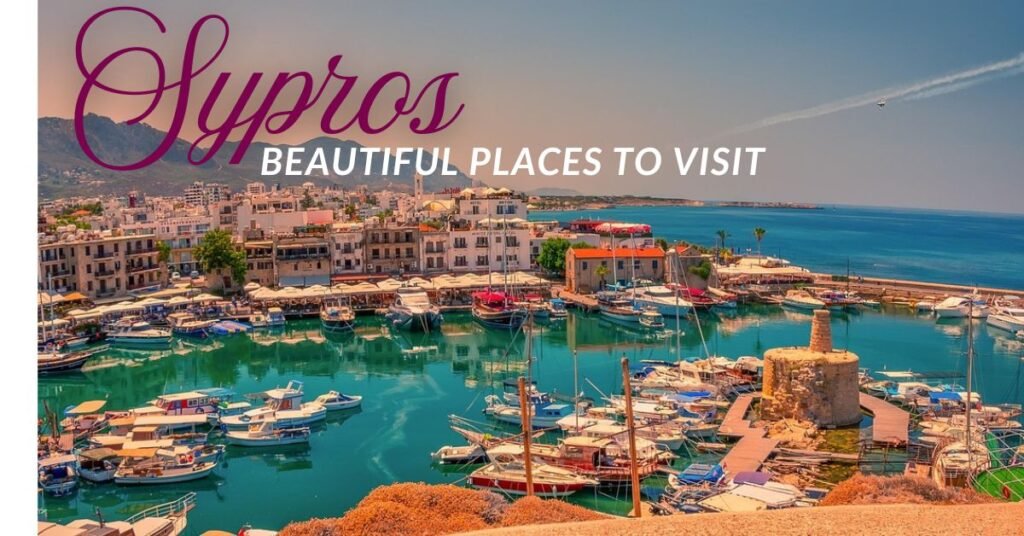
Cyprus Excitement and Enjoyment Destinations
Meta Description: Discover Cyprus’s hidden gems, budget-friendly hotels, and Mediterranean treasures. Your complete guide to affordable flights, family vacation ideas, and undiscovered paradises in 2025.
• Cyprus – The Mediterranean Jewel Awaits • Best Time to Visit Cyprus • Visa Requirements and Entry Information • Transportation and Getting Around • Top Destinations and Hidden Gems • Budget Accommodation Options • Local Cuisine and Dining • Family-Friendly Activities • Cultural Experiences and Local Traditions • Money-Saving Tips for All Budgets • Frequently Asked Questions
Picture this: you’re standing on golden sands, watching the sun paint the Mediterranean in shades of amber and gold, while ancient ruins whisper tales of civilizations past. This isn’t just a dream – it’s Cyprus, an island that has captured hearts for millennia. As someone who’s wandered through countless Mediterranean destinations, I can tell you that Cyprus holds a special magic that’s hard to find elsewhere.
Cyprus isn’t just another beach destination; it’s a treasure trove of experiences waiting to be unveiled. From the moment you step off the plane, you’re greeted by warm Mediterranean breezes and the promise of adventures that blend ancient history with modern luxury. Whether you’re seeking family vacation ideas or hunting for undiscovered paradises, Cyprus delivers experiences that linger long after you’ve returned home.
The island’s dual personality fascinates visitors – here, you can explore Byzantine churches adorned with stunning frescoes in the morning and dance the night away in vibrant beach clubs by evening. It’s this unique blend of cultural richness and natural beauty that makes Cyprus a destination where every traveler finds their perfect escape.
What makes Cyprus truly special isn’t just its stunning coastline or archaeological wonders – it’s the warmth of its people and the genuine hospitality that makes every visitor feel like family. The locals have a saying: “Cyprus doesn’t just welcome you, it embraces you.” After spending time here, you’ll understand exactly what they mean.
The Mediterranean climate of Cyprus offers something magical throughout the year, but timing your visit can make all the difference between a good trip and an extraordinary one. Having experienced Cyprus in different seasons, I can share some insider insights that will help you plan your perfect getaway.
Spring (April-May) emerges as Cyprus’s best-kept secret. The island awakens from its mild winter with wildflowers carpeting the countryside and temperatures hovering around a comfortable 22-25°C. This is when you’ll find the most affordable accommodation rates and fewer crowds at popular attractions. The weather is perfect for exploring Cultural Experiences without the summer heat.
Summer (June-September) brings the classic Mediterranean experience with abundant sunshine and warm seas perfect for swimming. However, July and August can be quite hot with temperatures reaching 35°C. If you’re planning a family vacation, early June or late September offer the perfect balance of warm weather and manageable heat levels.
Autumn (October-November) presents another sweet spot for visitors. The sea retains its summer warmth while air temperatures cool to pleasant levels. This season is ideal for combining beach relaxation with cultural exploration, making it perfect for those seeking both relaxation and enrichment.
Winter (December-March) offers a completely different Cyprus experience. While beach activities might be limited, this is when you truly discover the island’s cultural heart. Winter brings occasional rain that transforms the landscape into a lush, green paradise. Hotels offer their lowest rates, and you’ll have archaeological sites almost to yourself.
For budget-conscious travelers, I recommend visiting during shoulder seasons (April-May or October-November) when you can enjoy cheap flights and budget-friendly hotels without compromising on experience quality.
One of Cyprus’s greatest advantages as a destination is its straightforward entry requirements. For most travelers, visiting Cyprus is refreshingly simple – no visa hassles, no complicated paperwork, just pack your passport and go.
US and EU Citizens can enter Cyprus without a visa for stays up to 90 days. Your passport should be valid for at least three months beyond your planned departure date and contain at least two blank pages for entry stamps. This visa-free access makes Cyprus an incredibly accessible destination for spontaneous getaways.
UK Citizens continue to enjoy visa-free access to Cyprus for up to 90 days following Brexit. The entry process remains smooth, though it’s always wise to check current requirements before traveling.
Other Nationalities should consult the Cyprus Embassy in their country for specific requirements. Many countries enjoy visa-free access or visa-on-arrival privileges, making Cyprus one of the most welcoming destinations in the Mediterranean.
Entry Through Northern Cyprus requires additional consideration. If you plan to visit the Turkish-controlled northern part of the island, you’ll need to enter through the Republic of Cyprus (south) first, then cross at one of the designated crossing points.
COVID-19 Considerations: As of 2025, Cyprus has relaxed most pandemic-related restrictions, but it’s advisable to check current health requirements before departure. The island’s healthcare system is excellent, providing peace of mind for travelers.
Travel Insurance isn’t mandatory but is highly recommended. Cyprus offers excellent medical facilities, but having coverage ensures you can enjoy your vacation worry-free.
Navigating Cyprus is part of the adventure, and understanding your transportation options can significantly impact both your budget and experience quality. From my travels across the island, I’ve discovered that the key to experiencing Cyprus fully lies in choosing the right mix of transportation methods.
Arriving in Cyprus typically means flying into either Larnaca (LCA) or Paphos (PCA) airports. Larnaca serves as the main international hub, while Paphos caters more to European charter flights. Both airports offer excellent facilities and reasonable transfer options to your accommodation.
Airport Transfers range from budget-friendly buses to private transfers. The most economical option is the public bus system, costing around €1.50-4.00 to major cities. For families or groups, shared transfers offer good value at approximately €10-15 per person. Private transfers provide comfort and convenience, typically costing €25-50 depending on your destination.
Car Rental emerges as the most flexible option for exploring Cyprus’s hidden gems and undiscovered places. International rental companies operate at both airports, with prices starting around €15-25 per day for economy vehicles. Remember that Cyprus drives on the left side of the road, a legacy of British colonial rule.
Public Transportation has improved significantly in recent years. The island’s bus network connects major cities and tourist areas efficiently. A day pass costs around €5, making it an excellent option for budget-conscious travelers. However, buses to remote areas can be infrequent, so plan accordingly.
Taxis are widely available but can be expensive for longer distances. Urban trips typically cost €5-15, while inter-city journeys can reach €50-100. Many taxi drivers speak English and can provide valuable local insights.
Intercity Buses operate regular services between major cities like Nicosia, Limassol, Larnaca, and Paphos. These comfortable coaches cost €3-8 per journey and offer a budget-friendly way to explore different regions.
For those seeking cheap flights and budget-friendly hotels, I recommend booking rental cars in advance online, as this often provides better rates than airport counters. Consider staying in one central location and taking day trips to various attractions to minimize accommodation costs.
Cyprus reveals its true character through its diverse destinations, each offering unique experiences that cater to different travel styles and budgets. Let me take you on a journey through both the celebrated attractions and the secret treasures that make Cyprus unforgettable.
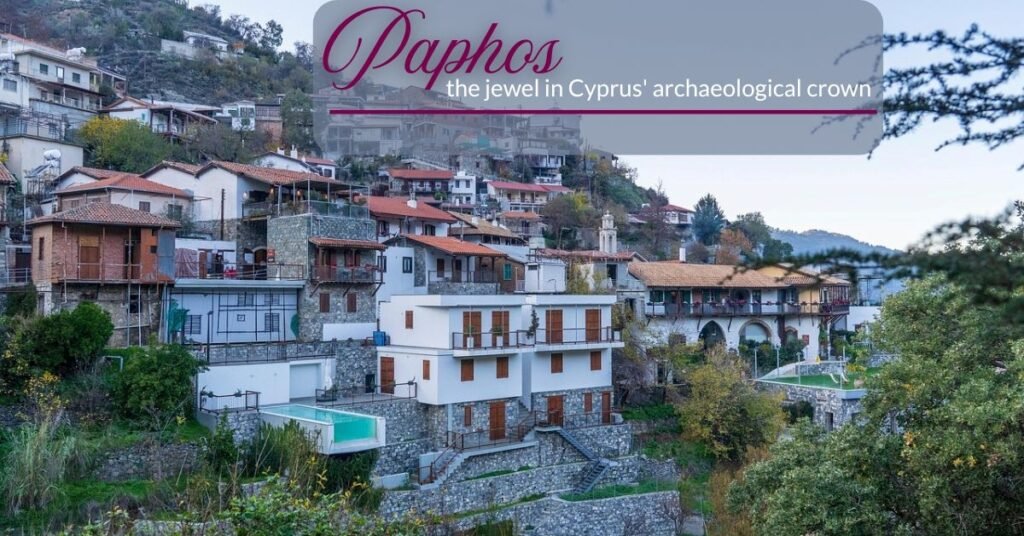
Paphos – Cyprus’s archaeological crown jewel
Paphos stands as Cyprus’s archaeological crown jewel, where every stone tells a story of ancient civilizations. The UNESCO World Heritage site houses the magnificent Paphos Archaeological Park, where intricate Roman mosaics depict scenes from Greek mythology with stunning detail. The nearby Tombs of the Kings, carved into solid rock, offer a glimpse into Hellenistic burial practices.
But Paphos isn’t just about ancient history. The charming harbor, lined with seafood restaurants and cafes, creates the perfect setting for romantic dinners. The nearby Coral Bay Beach provides excellent swimming conditions for families, while the Akamas Peninsula offers untouched natural beauty for adventure seekers.
Budget tip: Visit archaeological sites early morning or late afternoon to avoid crowds and heat. Many sites offer combination tickets that provide significant savings.
While Ayia Napa is famous for its nightlife, the destination offers much more than beach parties. Nissi Beach, with its crystal-clear waters and fine sand, consistently ranks among Europe’s best beaches. The nearby Cape Greco National Forest Park provides hiking trails with breathtaking sea views and the famous Love Bridge rock formation.
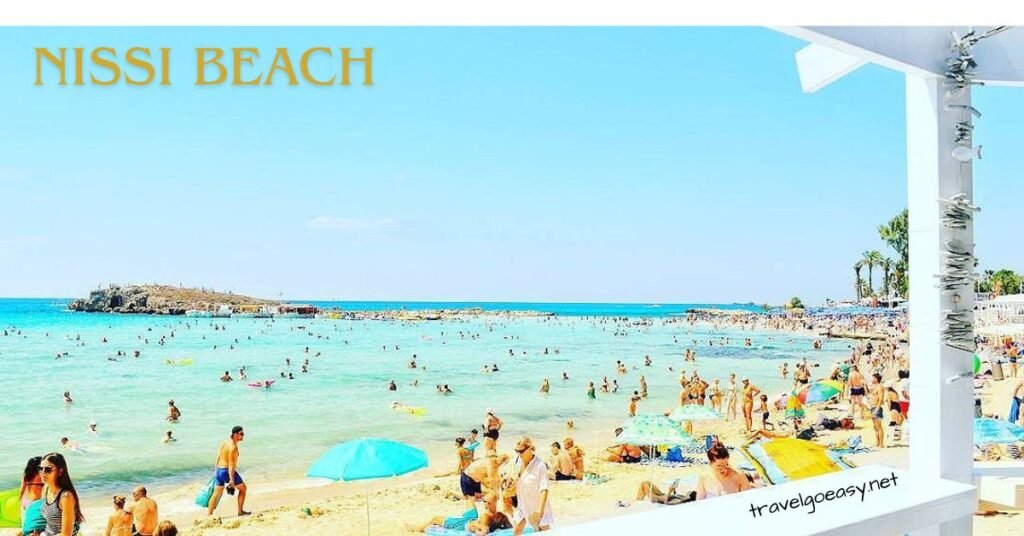
Nissi Beach
The Ayia Napa Monastery, dating back to the 16th century, offers a peaceful retreat in the town center. For families, the WaterWorld Waterpark provides hours of entertainment with themes based on ancient Greek mythology.
Local secret: Visit the Blue Lagoon early morning by boat to experience its pristine beauty before the crowds arrive. Many local operators offer budget-friendly half-day trips.
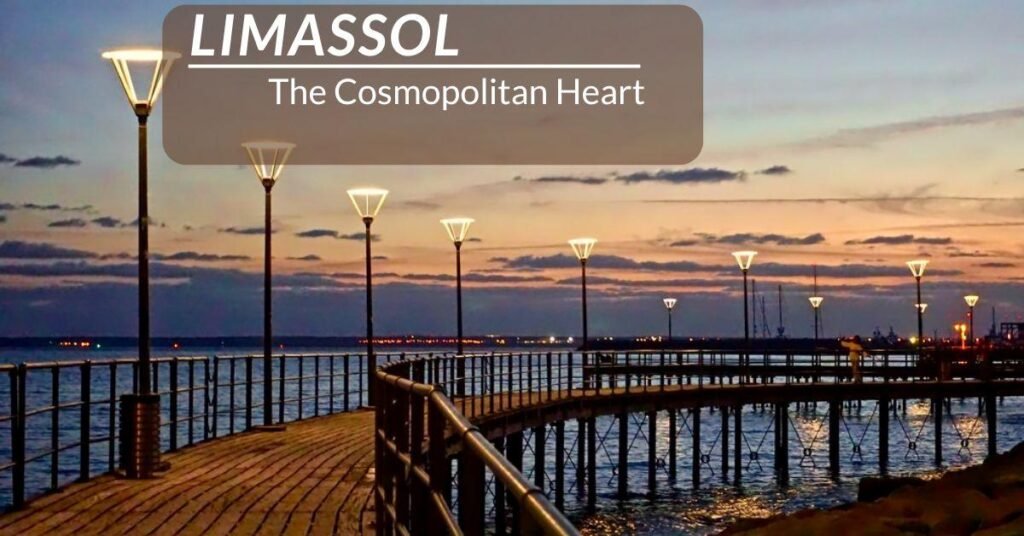
Limassol – The Cosmopolitan Heart
Limassol brilliantly balances urban sophistication with beach relaxation. The city’s marina development has created a luxury waterfront district, while the old town retains its authentic Cypriot character. The nearby Kolossi Castle and Kourion archaeological site provide easy day trips into Cyprus’s medieval and ancient past.
The Limassol Wine Festival, held annually in late summer, showcases the island’s emerging wine culture. The city’s central location makes it an excellent base for exploring both the Troodos Mountains and coastal attractions.
Insider tip: The Municipal Garden offers free Wi-Fi and beautiful shade for budget travelers looking to relax between sightseeing activities.
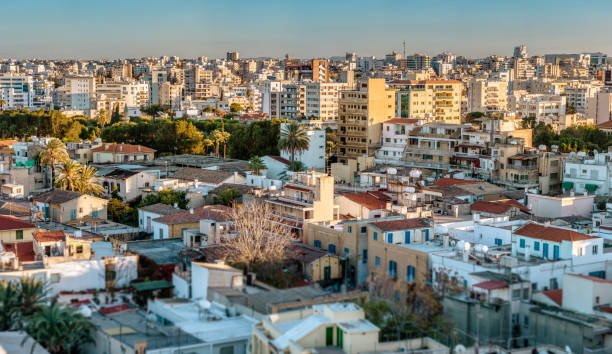
Nicosia presents a unique experience as the world’s last divided capital city. The walled old city, with its Venetian fortifications, houses museums, traditional craft shops, and authentic tavernas. The contrast between the modern southern part and the older northern section provides fascinating insights into Cyprus’s complex history.
The Cyprus Museum contains the island’s most important archaeological finds, while the Shacolas Tower offers panoramic views of the divided city. For those interested in Historical Wonders, Nicosia provides unparalleled access to Cyprus’s layered past.
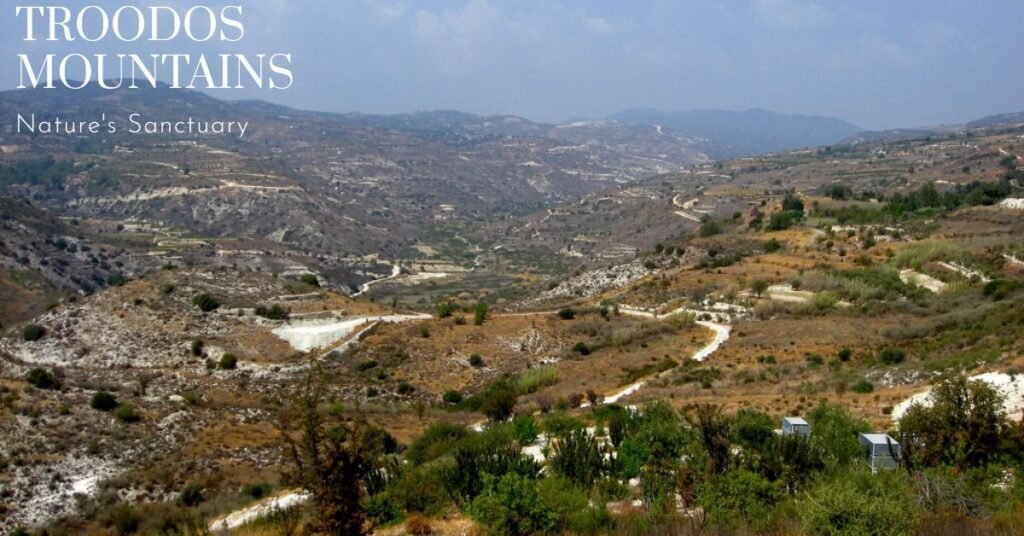
Troodos Mountains – Nature’s Sanctuary
The Troodos Mountains offer a completely different Cyprus experience, with Byzantine churches, mountain villages, and cooler temperatures. The painted churches of Troodos, many dating back to the 11th century, contain some of the finest Byzantine art in the world.
Mount Olympus, Cyprus’s highest peak, provides skiing opportunities in winter and hiking trails in summer. The mountain villages of Omodos and Lefkara preserve traditional crafts and offer authentic culinary experiences.
Hidden gem alert: The Millomeris Waterfall, accessible via a moderate hike, provides a refreshing swimming spot surrounded by lush vegetation.
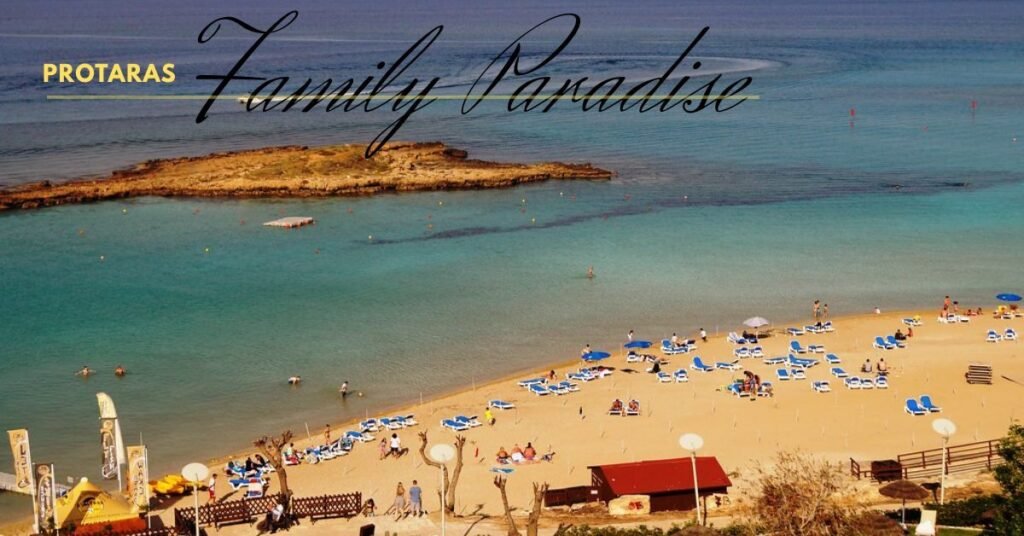
Protaras – Family Paradise
Protaras caters perfectly to families with its shallow, calm waters and wide sandy beaches. Fig Tree Bay consistently ranks among the world’s best beaches, while the nearby Paralimni Lake provides bird-watching opportunities and peaceful walks.
The area’s numerous beach bars and restaurants offer budget-friendly dining options with stunning sea views. The nearby Cavo Greco National Forest Park provides hiking trails suitable for all fitness levels.
For those seeking family vacation ideas, Protaras offers the perfect combination of relaxation and activities that keep both parents and children happy.
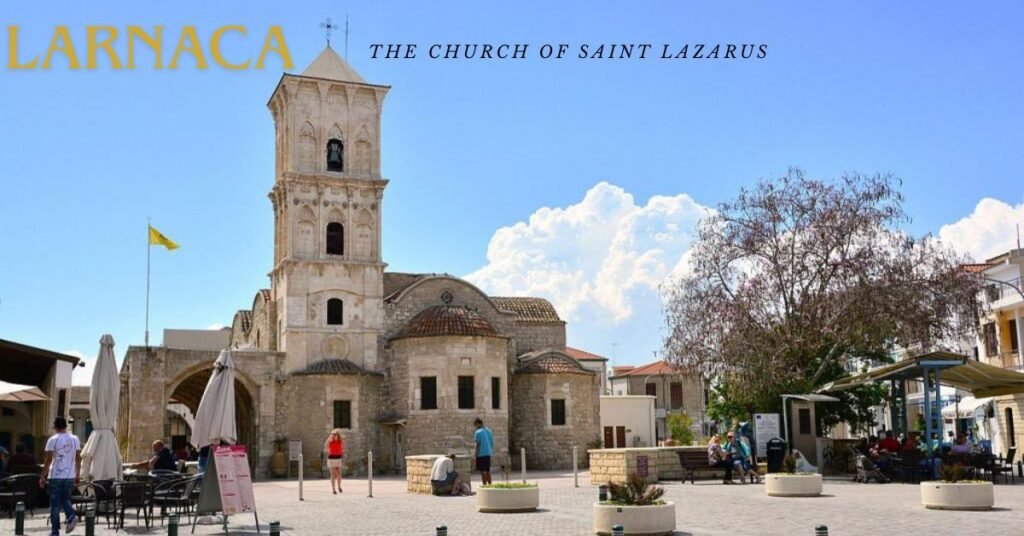
Larnaca – The Gateway with Character
Often overlooked as just a transit point, Larnaca rewards those who take time to explore. The Church of Saint Lazarus, built over the tomb of Jesus’s friend whom he raised from the dead, provides profound spiritual significance. The nearby Hala Sultan Tekke, one of Islam’s holiest sites, demonstrates Cyprus’s religious diversity.
The Larnaca Salt Lake transforms seasonally, hosting thousands of flamingos during winter months. The nearby Kamares Aqueduct provides a picturesque backdrop for sunset photography.
Budget-friendly discovery: The Larnaca Municipal Beach offers excellent swimming and sunbathing facilities completely free of charge, with nearby cafes providing affordable refreshments.
These destinations represent just the beginning of Cyprus’s treasures. Each location offers opportunities to discover unexplored wonders and create memories that last a lifetime. Whether you’re drawn to ancient history, natural beauty, or cultural experiences, Cyprus delivers authentic moments that transform ordinary vacations into extraordinary adventures.
Finding the perfect place to stay in Cyprus doesn’t have to break the bank. Through my extensive travels across the island, I’ve discovered accommodation options that provide excellent value without compromising on comfort or experience. Let me share the secrets to securing budget-friendly hotels and alternative accommodations that make your Cyprus adventure both affordable and memorable.
Cyprus offers numerous budget-friendly options that prove you don’t need to spend a fortune for a comfortable stay. In Ayia Napa, the Napa Plaza Hotel provides clean, comfortable rooms just minutes from the beach, with rates starting around €40-60 per night during shoulder seasons. The hotel’s central location saves money on transportation while putting you within walking distance of restaurants and attractions.
Paphos offers excellent value through family-run guesthouses like the Paphos Gardens Holiday Resort, where rates often include breakfast and start from €35-50 per night. These establishments provide authentic local hospitality and insider knowledge about the best budget dining spots and free activities.
In Limassol, the Pier Beach Hotel offers beachfront accommodation at surprisingly affordable rates, especially during spring and autumn. The hotel’s location provides direct beach access, eliminating the need for expensive beach club fees.
Money-saving tip: Many budget hotels offer significant discounts for direct bookings made through their websites, often including free breakfast or airport transfers that add substantial value to your stay.
For families or groups, apartment rentals provide exceptional value and flexibility. Self-catering accommodations allow you to save significantly on dining costs while providing the space and comfort of home. Platforms like Airbnb and local rental agencies offer options starting from €25-40 per night for entire apartments.
The Protaras area offers numerous vacation rentals with kitchen facilities, allowing families to prepare simple meals while still enjoying the resort atmosphere. Many rentals include access to communal pools and are located within walking distance of beaches and supermarkets.
Practical advice: Book accommodations with kitchen facilities and shop at local supermarkets like Papantoniou or Sklavenitis for significant savings on food costs. A week’s groceries for a family of four typically costs €80-120, compared to €200-300 for restaurant dining.
Cyprus’s hostel scene has expanded significantly, offering budget travelers excellent options for meeting fellow travelers while keeping costs minimal. The Shacolas Tower in Nicosia provides hostel-style accommodation in the heart of the divided capital, with dorm beds starting from €15-20 per night.
Larnaca offers several backpacker-friendly options near the airport, perfect for those with early flights or late arrivals. These hostels typically provide kitchen facilities, free Wi-Fi, and local advice from experienced staff.
Understanding Cyprus’s seasonal pricing patterns can result in substantial savings. High season (July-August) sees prices double or triple, while shoulder seasons (April-May and September-October) offer the best value proposition. Winter months (November-March) provide the lowest rates but with limited beach activities.
Insider secret: Many hotels offer “early bird” discounts for bookings made 60-90 days in advance, sometimes providing savings of 30-40% off standard rates.
Cyprus’s agritourism movement has created unique accommodation options that combine cultural experiences with budget-friendly pricing. Mountain villages in the Troodos region offer traditional houses converted into guesthouses, providing authentic experiences at rates starting from €30-45 per night.
Camping facilities exist throughout Cyprus, though they’re limited. The official campsites in the Troodos Mountains provide basic facilities at very low costs, perfect for nature enthusiasts on tight budgets.
Local tip: Contact the Cyprus Tourism Organisation for information about licensed accommodation providers offering special rates for extended stays or group bookings.
The key to securing the best accommodation deals lies in strategic booking. Compare prices across multiple platforms, but don’t forget to check hotel websites directly for exclusive deals. Many properties offer price matching policies that can secure additional discounts.
Consider booking refundable rates during shoulder seasons, as prices often drop closer to arrival dates. This strategy allows you to rebook at lower rates while maintaining flexibility.
Budget accommodation doesn’t mean sacrificing experience quality. Many of Cyprus’s most memorable stays come from smaller, family-run establishments that provide personal attention and local insights impossible to find in larger hotels. These properties often include homemade breakfasts, personalized recommendations, and genuine hospitality that transforms your stay from simple accommodation into cultural immersion.
Cyprus cuisine tells the story of the island’s complex history through every bite, blending Greek, Turkish, Middle Eastern, and Mediterranean influences into a unique culinary identity. Having sampled everything from street food to fine dining across the island, I can promise that Cyprus offers gastronomic adventures that satisfy every palate and budget.
Meze represents the heart of Cypriot dining culture. This collection of small dishes creates a social dining experience that can last hours. A traditional meze includes everything from grilled halloumi and village sausage to stuffed vine leaves and fresh seafood. Most restaurants offer meze options ranging from €15-25 per person, providing excellent value for the quantity and variety of food.
Souvlaki in Cyprus differs from its Greek counterpart, often served with pita bread and accompanied by tzatziki, tomatoes, and onions. Street vendors offer excellent souvlaki for €3-5, making it perfect for budget-conscious travelers.
Halloumi, Cyprus’s famous cheese, appears in numerous preparations beyond the typical grilled version. Try it fresh from local producers in mountain villages, where you can often visit the farms and learn about traditional cheese-making methods.
Kleftiko, slow-cooked lamb wrapped in parchment paper, represents Cyprus’s most celebrated traditional dish. The cooking method, dating back to ancient times, produces incredibly tender meat infused with herbs and vegetables.
Tavernas provide authentic experiences at reasonable prices. Family-run establishments in villages often offer three-course meals for €12-18 per person, including wine or beer. These tavernas source ingredients locally and prepare dishes using traditional recipes passed down through generations.
Kafeneia (coffee houses) serve simple, affordable meals alongside strong Cypriot coffee. These establishments, primarily frequented by locals, offer insight into daily Cypriot life while providing budget-friendly dining options.
Local markets provide ingredients for self-catering at fraction of restaurant costs. The Limassol Municipal Market and Paphos Municipal Market offer fresh produce, local cheeses, and traditional sweets. Shopping at these markets and preparing simple meals can reduce dining costs by 60-70%.
Street food options include souvlaki, gyros, and loukoumades (honey-soaked doughnuts). These portable meals typically cost €3-6 and provide quick, delicious options for busy sightseeing days.
Paphos excels in seafood preparation, with harbourside restaurants offering fresh fish at competitive prices. The sea bass and sea bream grilled with lemon and herbs provide simple perfection. Try the local red mullet, considered a delicacy throughout the Mediterranean.
Limassol offers the island’s best wine culture. The region’s wineries produce excellent local wines that pair perfectly with traditional dishes. Many wineries offer tastings and tours for €10-15 per person.
Troodos Mountains specialize in lamb dishes and mountain herbs. Village tavernas prepare afelia (pork cooked in red wine with coriander) and stifado (beef stew with pearl onions) using traditional methods.
Nicosia provides access to both Greek and Turkish Cypriot cuisines. The old city’s restaurants serve moussaka, pastitsio, and Turkish delight side by side, reflecting the island’s cultural diversity.
Cypriot dining emphasizes social connection over speed. Meals are meant to be enjoyed slowly, with conversation flowing as freely as the wine. Don’t be surprised if restaurant owners offer complimentary appetizers or desserts – this hospitality reflects genuine Cypriot warmth.
Tipping typically ranges from 10-15% in restaurants, though it’s not mandatory. Many locals round up the bill or leave small change for good service.
Lunch timing differs from Northern European habits. Many restaurants don’t serve lunch until 12:30-1:00 PM, and dinner service often begins at 7:00 PM or later.
Set menus often provide better value than ordering à la carte. Many restaurants offer tourist menus for €12-20 that include appetizer, main course, and dessert.
Happy hour specials extend beyond drinks to include food offerings. Many beach bars and restaurants offer reduced prices during off-peak hours.
Local wine costs significantly less than imported varieties and often tastes better with local cuisine. Cyprus produces excellent Commandaria dessert wine and increasingly good dry whites and reds.
Picnic supplies from local markets create memorable dining experiences at beaches or archaeological sites. Fresh bread, local cheese, tomatoes, and olives make perfect picnic ingredients at fraction of restaurant costs.
Group dining maximizes variety and value. Sharing meze or ordering family-style portions allows everyone to sample more dishes while reducing individual costs.
The culinary journey through Cyprus extends far beyond simple sustenance. Each meal provides opportunities to connect with local culture, meet fellow travelers, and create memories that enhance your overall Cyprus experience. Whether you’re enjoying cheap flights and budget-friendly hotels or splurging on luxury experiences, Cyprus’s food scene offers authentic flavors that satisfy every budget and preference.
Cyprus transforms into a family paradise where children’s laughter mingles with Mediterranean breezes, creating memories that last lifetimes. Having witnessed countless families discover the island’s magic, I can confidently say that Cyprus offers the perfect blend of education, adventure, and relaxation that keeps both parents and children engaged and happy.
Fig Tree Bay in Protaras stands as Cyprus’s premier family beach, where shallow, crystal-clear waters provide safe swimming for children while parents relax on golden sand. The beach’s gentle slope allows toddlers to play safely in ankle-deep water while older children can swim and snorkel in deeper areas. Beach volleyball courts and water sports equipment rentals keep teenagers engaged.
Coral Bay near Paphos offers similar family-friendly conditions with the added benefit of nearby restaurants and cafes. The bay’s protected location ensures calm waters perfect for family swimming, while the surrounding cliffs provide shade during midday heat.
Nissi Beach in Ayia Napa combines family activities with stunning natural beauty. The famous sandbar connecting to a small island creates a unique playground where children can “walk on water” during low tide. The beach’s facilities include changing rooms, showers, and equipment rentals.
Budget-friendly beach tip: Many beaches offer free umbrellas and sunbeds for customers purchasing drinks or snacks from beach bars. This arrangement provides comfort while keeping costs reasonable.
WaterWorld Waterpark in Ayia Napa, themed around ancient Greek mythology, provides full-day entertainment for families. The park’s slides, pools, and attractions cater to all ages, from toddler splash areas to adrenaline-pumping slides for teenagers. Day passes cost €32 for adults and €22 for children, providing excellent value for full-day entertainment.
Fasouri Watermania near Limassol offers similar attractions with additional features like lazy rivers and wave pools. The park’s location makes it easily accessible from most accommodation areas.
Aphrodite Waterpark in Paphos provides a more intimate experience with attractions designed specifically for families with younger children. The park’s smaller size allows parents to supervise children more easily while still providing exciting activities.
Paphos Archaeological Park transforms history lessons into adventure quests. Children love exploring the ancient ruins while parents provide context about Roman and Greek civilizations. The park’s mosaics, particularly the House of Dionysos, captivate young imaginations with their colorful depictions of mythological scenes.
Cyprus Medieval Museum in Limassol Castle provides interactive exhibits that bring medieval life to reality. Children can try on replica armor and learn about knights and castles through hands-on activities.
Pierides Museum in Larnaca offers family-friendly guided tours that explain Cyprus’s ancient history through artifacts and interactive displays. The museum’s Cyprus room contains treasures that span 5,000 years of human civilization.
Local villages in the Troodos Mountains provide authentic cultural experiences. Children can watch traditional crafts being made, participate in olive picking during harvest season, and learn about rural Cypriot life through direct experience.
Akamas Peninsula offers family hiking trails with varying difficulty levels. The nature reserve’s trails lead to pristine beaches, provide wildlife viewing opportunities, and offer educational experiences about Mediterranean ecosystems. The shorter trails are perfect for families with young children, while longer routes challenge older kids and teenagers.
Larnaca Salt Lake provides excellent bird-watching opportunities, particularly during winter months when flamingos visit the lake. The flat walking paths around the lake are suitable for strollers and provide educational opportunities about migratory birds and wetland ecosystems.
Troodos National Forest Park offers numerous family-friendly hiking trails with picnic areas and playgrounds. The cooler mountain temperatures provide relief from coastal heat while offering completely different scenery and activities.
Turtle watching at Lara Beach provides unforgettable wildlife experiences. During nesting season (May-August), organized tours allow families to observe sea turtles in their natural habitat while learning about conservation efforts.
Jeep safaris through the Troodos Mountains provide adventure and education combined. These tours visit traditional villages, Byzantine churches, and natural attractions while providing safe excitement for the whole family.
Boat trips to the Blue Lagoon and sea caves offer marine adventures that thrill children while providing stunning scenery for parents. Many operators offer family-friendly trips with swimming stops and snorkeling opportunities.
Cycling tours along coastal paths provide gentle exercise and sightseeing opportunities. Many areas offer bicycle rentals with child seats and helmets, making cycling accessible for families with young children.
Rock climbing at suitable locations provides supervised adventure for older children and teenagers. Several operators offer family-friendly climbing experiences with certified instructors.
Accommodation selection significantly impacts family vacation success. Apartments with kitchen facilities allow families to prepare familiar meals while providing space for children to play. Many family-friendly hotels offer kids’ clubs and supervised activities that give parents occasional breaks.
Transportation with children requires planning. Rental cars provide flexibility for families, while public buses offer budget-friendly transportation with the added adventure of local interaction.
Packing essentials for Cyprus families include sun protection, comfortable walking shoes, and light clothing for various activities. Many items can be purchased locally, but bringing familiar brands ensures children’s comfort.
Activity timing should consider Cyprus’s climate. Early morning and late afternoon provide the best conditions for outdoor activities, while midday heat is perfect for swimming and indoor attractions.
Cyprus’s family-friendly nature extends beyond activities to include the genuine warmth of local people who welcome children enthusiastically. Restaurant owners often provide special attention to families, and many establishments offer children’s menus and high chairs. This combination of activities, facilities, and hospitality creates an environment where families can relax and enjoy their vacation while creating lasting memories together.
The island’s compact size means that families can experience diverse activities without lengthy travel times, from Nature & Wildlife adventures to Popular Destinations that cater specifically to family needs. Whether you’re seeking adventure, relaxation, or cultural enrichment, Cyprus delivers family experiences that satisfy every age group and interest level.
Cyprus’s cultural tapestry weaves together thousands of years of history, creating a living museum where ancient traditions thrive alongside modern life. As I’ve explored the island’s cultural depths, I’ve discovered that Cyprus offers visitors authentic experiences that connect them to Mediterranean heritage in profound and meaningful ways.
Byzantine Churches scattered throughout the Troodos Mountains contain some of the world’s finest religious art. The painted churches, many dating to the 11th century, showcase Byzantine artistry at its peak. The Church of Agios Nikolaos tis Stegis near Kakopetria contains frescoes that tell biblical stories with remarkable detail and color preservation.
Kykkos Monastery, Cyprus’s most famous religious site, houses an icon of the Virgin Mary painted by Saint Luke. The monastery’s museum displays religious artifacts, manuscripts, and traditional crafts that illuminate Orthodox Christian traditions. Visiting during morning services provides insight into contemporary religious practices.
Hala Sultan Tekke near Larnaca represents one of Islam’s most important pilgrimage sites. The mosque, built over the tomb of Prophet Muhammad’s wet nurse, demonstrates Cyprus’s religious diversity and tolerance. The peaceful lakeside setting creates contemplative atmosphere perfect for reflection.
Saint Barnabas Monastery in the north showcases early Christian history through its archaeological museum and ancient church. The site’s connection to Cyprus’s conversion to Christianity provides historical context for the island’s religious development.
Lefkara village preserves traditional lace-making techniques that have earned UNESCO recognition. Walking through the village’s narrow streets, visitors can observe artisans creating intricate lacework using methods passed down through generations. The village also produces beautiful silverware using traditional techniques.
Omodos in the Troodos Mountains offers authentic mountain village experiences centered around wine production. The village’s traditional architecture, combined with family-run wineries, provides insight into rural Cypriot life. Visitors can participate in grape harvesting during autumn months and learn traditional wine-making methods.
Pano Platres and Troodos Village maintain traditional mountain lifestyles where locals still practice ancient customs. These villages offer opportunities to witness traditional cooking methods, learn about medicinal plants, and understand how mountain communities have adapted to their environment over centuries.
Pottery traditions in Cyprus date back thousands of years, with each region developing distinct styles and techniques. The village of Kornos specializes in large storage jars (pithoi) using techniques unchanged since ancient times. Visitors can watch potters at work and even try their hand at creating traditional pieces.
Basket weaving using local materials like palm fronds and wild grasses continues in rural areas. These functional crafts serve practical purposes while maintaining aesthetic beauty. Many artisans offer workshops where visitors can learn basic techniques.
Copper work in Lefkara and other villages produces both decorative and functional items using traditional methods. The craft’s history connects to Cyprus’s ancient copper mines, which gave the island its name.
Traditional Cypriot music blends Greek, Turkish, and Middle Eastern influences, creating unique sounds that reflect the island’s cultural complexity. The bouzouki, violin, and lute provide instrumental accompaniment to songs that tell stories of love, loss, and village life.
Folk dancing remains an integral part of celebrations and festivals. The syrtos and zeimbekiko dances connect participants to ancestral traditions while providing entertainment. Many villages host dance evenings where visitors can learn traditional steps.
Singing traditions include both religious and secular music. Village festivals often feature local choirs performing traditional songs that have been passed down orally through generations.
Bread making in traditional ovens continues in many villages, where families still bake weekly bread using wood-fired ovens. The process involves community cooperation and maintains social bonds while producing superior bread.
Olive oil production follows ancient methods in many rural areas. Visitors can participate in olive harvesting and witness traditional pressing techniques that produce oil with distinctive flavors.
Cheese making, particularly halloumi production, remains a family tradition in many villages. Some producers welcome visitors to observe the process and sample fresh cheese directly from the source.
Wine traditions extend back thousands of years, with Cyprus producing Commandaria, claimed to be the world’s oldest named wine. Traditional wineries offer tastings and explanations of ancient wine-making techniques.
Easter celebrations in Cyprus blend religious significance with community fellowship. The midnight service on Easter Saturday, followed by traditional soup and celebration, provides profound cultural immersion. Each village has unique traditions that visitors can respectfully observe.
Harvest festivals throughout the year celebrate agricultural abundance. The Grape Festival in Limassol, Orange Festival in various towns, and Rose Festival in Agros combine cultural performances with local food and wine.
Kataklysmos (Festival of the Flood) combines religious observance with water-themed celebrations. The festival’s unique traditions include water fights and seaside festivities that demonstrate Cyprus’s adaptation of ancient customs to local conditions.
Greek Cypriot dialect differs significantly from mainland Greek, incorporating Turkish, Arabic, and Italian influences. Learning basic phrases enhances interactions with locals and shows respect for local culture.
English proficiency is widespread due to British colonial history, making cultural exchange easier for English-speaking visitors. However, attempting to communicate in Greek or Turkish often results in warmer interactions and deeper cultural connections.
Contemporary arts in Cyprus blend traditional themes with modern expression. Galleries in Nicosia and Limassol showcase local artists who reinterpret traditional motifs through contemporary media.
Cultural centers throughout Cyprus offer programs that teach traditional crafts, music, and dance to both locals and visitors. These institutions work to preserve cultural heritage while making it accessible to new generations.
Museums dedicated to specific aspects of Cypriot culture provide deeper understanding of traditions. The Folk Art Museum in Nicosia and various village museums offer comprehensive collections that illustrate cultural development over time.
Cyprus’s cultural experiences extend beyond simple observation to active participation. Visitors can join cooking classes, learn traditional crafts, participate in festivals, and engage with local communities in meaningful ways. This cultural immersion transforms typical tourism into genuine cultural exchange that enriches both visitors and local communities.
The island’s cultural heritage isn’t confined to museums or designated sites – it lives in daily interactions, family traditions, and community celebrations. By engaging respectfully with local customs and showing genuine interest in Cypriot traditions, visitors gain access to authentic cultural experiences that provide lasting memories and deeper understanding of Mediterranean civilization.
Understanding and respecting local customs enhances every aspect of a Cyprus visit, from Cultural Experiences to simple daily interactions. This cultural awareness transforms routine activities into meaningful exchanges that create connections between visitors and the timeless traditions that define Cyprus’s unique character.
Traveling to Cyprus on a budget doesn’t mean sacrificing quality or missing out on incredible experiences. Through years of exploring the island and helping countless travelers maximize their vacation value, I’ve developed proven strategies that allow you to enjoy Cyprus’s best offerings while keeping costs under control. These tips work whether you’re planning a luxury getaway or backpacking adventure.
Timing your booking can save 30-50% on accommodation costs. Book during shoulder seasons (April-May, September-October) for the best balance of weather and prices. Many hotels offer early booking discounts of 20-30% for reservations made 60-90 days in advance.
Alternative accommodation types provide significant savings. Apartment rentals through local agencies often cost less than international platforms while offering better locations and amenities. Family-run guesthouses provide authentic experiences at budget-friendly prices, often including breakfast and local recommendations.
Location flexibility opens up substantial savings opportunities. Staying slightly inland from beach resorts can reduce accommodation costs by 40-60% while still providing easy beach access. Villages like Peyia near Paphos or Paralimni near Protaras offer authentic experiences at fraction of resort prices.
Extended stay discounts reward longer visits. Many properties offer weekly rates that provide one or two free nights, effectively reducing daily costs by 15-25%. This strategy works particularly well for apartments and vacation rentals.
Public transportation provides excellent value for money. The island’s improved bus network connects major destinations efficiently, with day passes costing around €5. Weekly passes offer even better value for longer stays.
Car rental strategies can significantly reduce transportation costs. Booking economy vehicles well in advance provides better rates than last-minute bookings. Consider manual transmission vehicles, which often cost 20-30% less than automatic options.
Fuel efficiency matters in Cyprus. Smaller vehicles not only rent for less but also consume less fuel on the island’s hilly terrain. Plan routes efficiently to minimize driving distances and fuel consumption.
Walking and cycling reduce transportation costs while providing exercise and closer connection to local environments. Many coastal areas offer pleasant walking paths, while mountain villages provide scenic cycling routes.
Self-catering provides the most significant food savings. Apartments with kitchen facilities allow you to prepare simple meals using local ingredients. Shopping at local markets reduces food costs by 60-70% compared to restaurant dining.
Lunch specials offer excellent value at many restaurants. Traditional tavernas often provide set lunch menus for €8-12 that include appetizer, main course, and drink. These portions are typically generous enough to satisfy hearty appetites.
Local markets provide fresh, affordable ingredients. The Limassol Municipal Market, Paphos Municipal Market, and various village markets offer seasonal produce at much lower prices than supermarkets.
Happy hour dining extends beyond drinks to include food specials. Many restaurants offer reduced prices on appetizers and small plates during off-peak hours, allowing you to sample various dishes affordably.
Picnic supplies create memorable dining experiences at beaches and archaeological sites. Fresh bread, local cheese, tomatoes, and olives make perfect picnic ingredients at fraction of restaurant costs.
Free activities abound throughout Cyprus. Beach access is free at public beaches, hiking trails cost nothing, and many archaeological sites have free viewing areas. Village festivals and cultural events often welcome visitors without charge.
Combination tickets provide savings for multiple attractions. Many archaeological sites offer joint tickets that reduce individual entry fees. The Cyprus Museum and various Paphos sites often have combination deals.
Off-season advantages extend beyond accommodation to include attraction pricing. Many sites offer reduced entry fees during winter months, while summer activities like boat trips often have shoulder-season discounts.
Local guides through village recommendations can provide authentic experiences at lower costs than tour companies. Many locals offer informal tours in exchange for modest fees, providing insider knowledge impossible to find through commercial operators.
Local markets provide authentic souvenirs at reasonable prices. Traditional crafts purchased directly from artisans cost significantly less than hotel gift shops while supporting local communities.
Timing purchases strategically can yield savings. End-of-season sales at clothing and accessory shops provide excellent deals on quality items. Many shops offer discounts for cash payments.
Authentic local products provide better value than tourist-oriented items. Local wines, olive oil, and traditional foods offer genuine souvenirs that cost less than mass-produced alternatives.
Free Wi-Fi is available throughout Cyprus at cafes, restaurants, and public spaces. Many accommodation providers offer complimentary internet access, reducing the need for expensive roaming charges.
Local SIM cards provide affordable communication options for longer stays. Cyprus mobile providers offer tourist packages that include data and calling at fraction of roaming costs.
Offline maps and travel apps reduce the need for expensive data usage while providing navigation and information services.
Shoulder seasons (April-May, September-October) provide the best overall value. Accommodation costs drop 30-50%, restaurant prices often decrease, and many attractions offer reduced fees. Weather remains excellent for most activities.
Winter visits can provide substantial savings for travelers interested in cultural experiences rather than beach activities. Hotel rates drop to yearly lows, and many restaurants offer special menus and prices.
Summer strategies for budget travelers include booking accommodations away from beaches, utilizing public transportation, and taking advantage of extended daylight hours for activities.
Shared accommodations reduce individual costs while providing social experiences. Apartment rentals and vacation homes often provide better per-person rates for groups.
Group discounts apply to many activities and attractions. Tour operators, restaurants, and activity providers often offer reduced rates for groups of 4-6 people.
Shared transportation through rental cars or private transfers can cost less per person than individual public transportation for groups visiting multiple destinations.
Befriend locals who can provide valuable money-saving advice. Hotel staff, restaurant owners, and shop proprietors often share information about free events, hidden gems, and local deals.
Avoid tourist traps by researching authentic local experiences. Restaurants and shops frequented by locals typically offer better value than those targeting tourists exclusively.
Learn basic phrases in Greek, as locals often provide better service and prices to visitors who make effort to communicate in the local language.
The key to budget travel in Cyprus lies in balancing cost savings with experience quality. By implementing these strategies selectively based on your priorities, you can enjoy authentic Cyprus experiences while maintaining financial control. Whether you’re seeking cheap flights and budget-friendly hotels or looking to maximize the value of a higher-end budget, these proven techniques help you experience Cyprus’s best offerings without breaking the bank.
Remember that the most memorable travel experiences often cost little or nothing – watching sunset from a village square, swimming in crystal-clear waters, or sharing conversation with friendly locals. Cyprus’s greatest treasures lie not in expensive attractions but in the authentic moments that connect you to this remarkable island’s timeless charm.
Planning your Cyprus adventure requires balancing dreams with practical considerations, but the reward is an unforgettable Mediterranean experience that exceeds expectations. Having helped countless travelers plan their Cyprus journeys, I’ve learned that successful trips combine careful preparation with flexibility for spontaneous discoveries.
Research and inspiration should begin months before departure. Cyprus offers such diverse experiences that understanding your priorities helps focus planning efforts. Are you seeking Honeymoon Getaways with romantic settings, Family Trip Planning with activities for all ages, or Hidden Gems off the beaten path?
Budget establishment provides the foundation for all other decisions. Cyprus accommodates budgets from €50 per day for backpackers to luxury experiences exceeding €300 daily. Understanding your financial boundaries helps narrow choices and prevents overspending.
Travel document preparation ensures smooth entry. Verify passport validity (minimum 3 months beyond departure date), research visa requirements for your nationality, and consider travel insurance options. Keep digital copies of important documents accessible online.
Health and safety research provides peace of mind. Cyprus maintains excellent healthcare standards, but understanding local medical facilities and emergency procedures enhances travel confidence. Consider European Health Insurance Card for EU citizens or comprehensive travel insurance for others.
Duration determination significantly impacts experience quality. Weekend trips focus on single regions, while week-long visits allow broader exploration. Two-week stays enable deep cultural immersion and relaxed pacing that reveals Cyprus’s authentic character.
Regional focus prevents over-scheduling while ensuring quality experiences. Cyprus’s compact size tempts visitors to attempt everything, but focusing on 2-3 regions allows deeper exploration and reduces transportation stress.
Activity balance between active sightseeing and relaxation prevents vacation burnout. Alternate busy days with leisure time, allowing spontaneous discoveries and genuine rest. Cyprus’s relaxed pace rewards visitors who embrace flexibility.
Seasonal considerations affect both weather and cultural experiences. Summer prioritizes beach activities, while spring and autumn excel for hiking and sightseeing. Winter offers cultural immersion and budget advantages despite limited beach activities.
Location priorities should match your travel style. Beach lovers benefit from coastal accommodations, while culture enthusiasts might prefer historic city centers. Budget travelers often find better value slightly inland while maintaining easy access to attractions.
Amenity requirements vary by travel style. Self-catering facilities benefit families and budget travelers, while luxury amenities suit celebration trips. Consider pool access, Wi-Fi availability, and parking needs based on your plans.
Booking timing affects both availability and pricing. Popular destinations and peak seasons require early booking, while shoulder seasons offer more flexibility and often better rates for last-minute bookings.
Arrival airport selection influences subsequent travel logistics. Larnaca Airport serves as the main international hub with better connections, while Paphos Airport caters primarily to European charter flights but offers convenient access to western Cyprus.
Ground transportation depends on your itinerary scope. Rental cars provide maximum flexibility for exploring undiscovered places and secret treasures, while public transportation suffices for visitors focusing on major cities and beaches.
Inter-destination travel requires realistic time estimates. Cyprus’s mountainous terrain means driving times often exceed map distances. Build buffer time into schedules for unexpected discoveries and photo opportunities.
Advance reservations ensure availability for popular attractions and experiences. Summer boat trips, guided tours, and special events often sell out, particularly during peak season. However, over-scheduling reduces flexibility for spontaneous discoveries.
Local recommendations often provide the best experiences. Hotel staff, restaurant owners, and local residents offer insights into authentic experiences impossible to find through online research. Maintain openness to unexpected suggestions.
Weather contingency plans prevent disappointment. Cyprus’s generally favorable weather occasionally brings rain or strong winds that affect outdoor activities. Having indoor alternatives ensures productive days regardless of conditions.
Language basics enhance interactions with locals. While English is widely spoken, learning basic Greek phrases demonstrates respect and often results in warmer welcomes and helpful advice.
Cultural awareness prevents misunderstandings and shows respect for local customs. Understanding appropriate dress codes for religious sites, dining etiquette, and social norms enhances experiences and interactions.
Historical context enriches visits to archaeological sites and museums. Basic knowledge of Cyprus’s complex history helps visitors appreciate the significance of various attractions and cultural experiences.
Climate-appropriate clothing ensures comfort throughout your visit. Cyprus’s Mediterranean climate requires sun protection, light layers, and comfortable walking shoes. Elevation changes in mountain areas necessitate warmer clothing for evening activities.
Technology preparation includes unlocked phones for local SIM cards, appropriate charging adapters, and offline maps for areas with limited connectivity. Consider power banks for extended sightseeing days.
Health and safety items should include sunscreen, insect repellent, and basic first aid supplies. Cyprus’s excellent healthcare system provides peace of mind, but basic preparations prevent minor issues from disrupting vacations.
Confirm all bookings and review cancellation policies. Print important documents and save digital copies in accessible locations. Share itinerary details with family or friends for safety purposes.
Research current events and local conditions. Cyprus’s political situation remains stable, but understanding current affairs provides context for visits and prevents inadvertent cultural insensitivity.
Set realistic expectations while maintaining excitement. Cyprus delivers incredible experiences, but flexibility and openness to unexpected discoveries often provide the most memorable moments.
The magic of Cyprus lies not just in its stunning beaches or ancient ruins, but in the serendipitous moments that occur when preparation meets opportunity. By planning thoroughly while remaining flexible, you create conditions for extraordinary experiences that transform ordinary vacations into life-changing adventures.
Your Cyprus journey begins with that first spark of curiosity, grows through careful planning, and culminates in memories that last lifetimes. Whether you’re seeking Planning Tourist Routes through ancient sites or Planning Travel Trips that combine relaxation with adventure, Cyprus rewards thoughtful preparation with experiences that exceed expectations.
The island’s timeless appeal lies in its ability to provide exactly what each visitor seeks – romance, adventure, culture, relaxation, or authentic connection with Mediterranean life. Your perfect Cyprus adventure awaits, ready to unfold through careful planning and enthusiastic exploration.
Most visitors, including US and EU citizens, don’t need a visa for stays up to 90 days. Your passport should be valid for at least 3 months beyond your planned departure date.
The ideal time is April-May and September-October for perfect weather and fewer crowds. Summer (June-August) offers the best beach conditions but can be very hot and crowded.
Cyprus suits all budgets. Budget travelers can manage on €50-70 daily, while mid-range visitors spend €100-150 daily. Luxury travelers can expect €200+ daily.
Yes, Cyprus is very safe with low crime rates. Standard travel precautions apply, particularly regarding sun exposure and swimming safety.
English is widely spoken due to British colonial history. Most tourism professionals, restaurant staff, and younger locals speak good English.
Cyprus uses the Euro (€). Credit cards are widely accepted, but carry cash for small tavernas and local markets.
Yes, tap water is safe to drink throughout Cyprus, though bottled water is readily available and preferred by many visitors.
Pack light, breathable clothing, strong sunscreen, comfortable walking shoes, and a hat. Bring modest clothing for religious sites and warmer layers for mountain areas.
Cyprus calls to travelers seeking authentic Mediterranean experiences beyond ordinary tourism. This enchanting island offers perfect combinations of ancient history, stunning beaches, genuine hospitality, and incredible value that create unforgettable memories.
From hidden gems waiting to be discovered to family vacation ideas that satisfy every age group, Cyprus delivers experiences that exceed expectations while respecting every budget. Whether you’re planning a romantic getaway, family adventure, or solo exploration, the island’s timeless appeal ensures your journey becomes the vacation you’ll always remember.
Don’t just dream about Mediterranean paradise – make it reality. Start planning your Cyprus adventure today and discover why this remarkable island has captured hearts for thousands of years. Your perfect Cyprus story begins with a single step: deciding to explore one of the Mediterranean’s most captivating destinations.
Ready to experience Cyprus’s magic? Visit Travel Go Easy for exclusive deals on flights, accommodations, and complete Cyprus vacation packages that turn dreams into reality.
This article is exclusively created for travelgoeasy.net and is protected by copyright. All rights reserved. No part of this content may be reproduced or used without written permission.
Targeted Keywords: Cyprus tourism, Mediterranean travel, budget travel Cyprus, Cyprus vacation guide, Cyprus attractions, Cyprus beaches, Cyprus hotels, Cyprus activities, Cyprus travel tips, Cyprus family vacation, Cyprus hidden gems, Cyprus cultural experiences, Cyprus accommodation, Cyprus transportation, Cyprus restaurants, Cyprus itinerary, Cyprus travel planning, cheap flights Cyprus, budget-friendly hotels Cyprus, Cyprus holiday guide